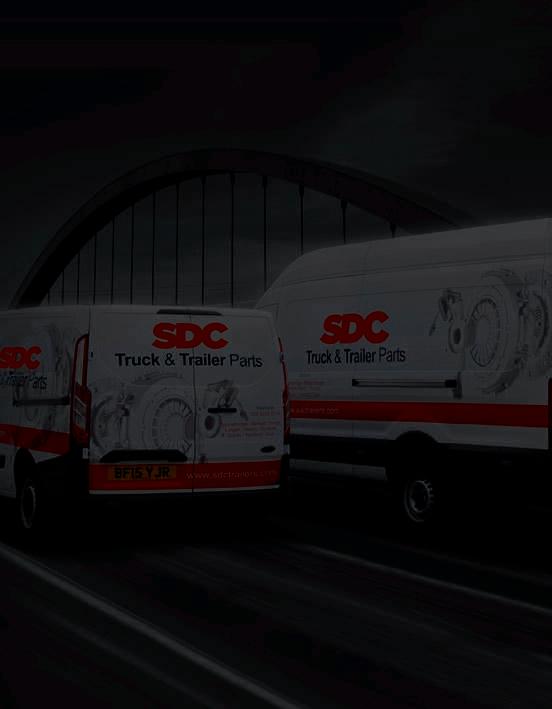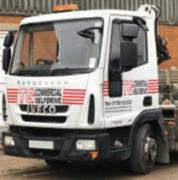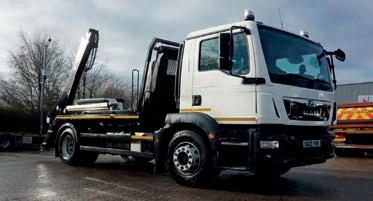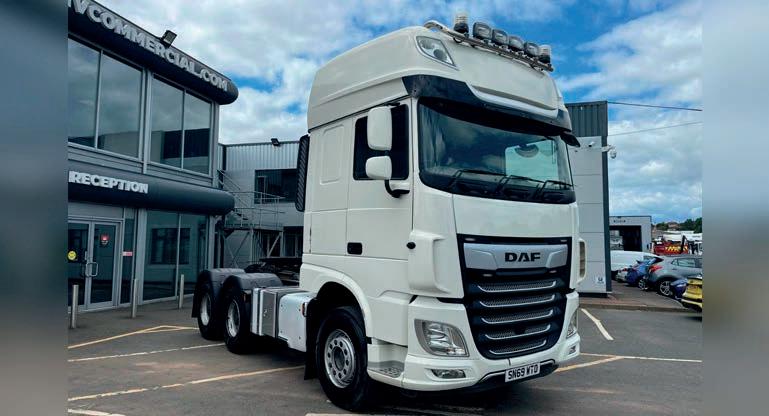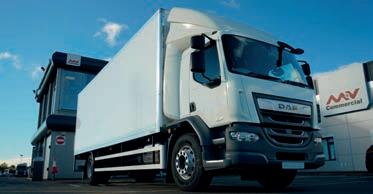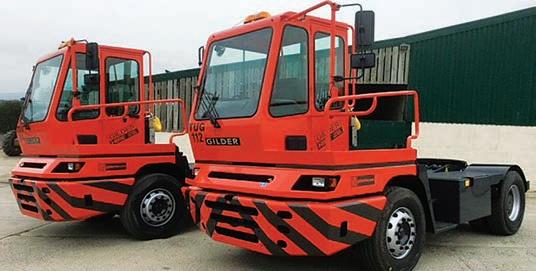Industry responds to PM’s delay on ICE ban
by Chris TindallThe phase-out dates for diesel HGVs could still change following the government’s announcement that it is to postpone its ban on the sale of new diesel and petrol cars and vans, according to freight experts.
A spokesman for Volvo Trucks said that although the government announcement did not appear to directly affect the medium and heavy truck sector, “there are clearly close ties between all automotive markets, be it cars, vans, buses, coaches or trucks.”
He added that the government’s role was to set a long-term target and stick to it: “Together with our customers, who quite literally deliver UK GDP, the road transport industry is navigating its way through a massive transformation – the biggest we have seen since the introduction of the internal combustion engine.
“We all know that we need to find alternatives to diesel. We cannot continue as we have in the past; we must decarbonise, and to do that, we need support from government.
“Naturally some of the policies required to support such a target
will take the form of sticks, but there should be carrots too. What’s key is that government policies be consistent both through time and across government, to ensure that collectively we meet the target.”
The RHA said the government had failed to lay out a clear plan, which it said was detrimental for the industry. The association added that it is seeking “urgent clarity” from government on what the announcement means for the future of HGVs. “Businesses looking to play their part on the road to net zero need certainty, not delays,” it warned.
David Wells, chief executive of
Freight procurement marketplace launched
Transporeon has launched Freight Marketplace, a deal-making hub for freight procurement, which it said is of equal benefit to shippers and carriers. Freight Marketplace addresses the challenges of aligning capacity and assessing fair pricing with a tool designed to transform logistics procurement and redefine how companies buy, sell, negotiate and contract.

Its key benefits include: a central location for deal-making; simplified negotiations; multidimensional negotiations that factor in sustainability; and enhanced visibility and
transparency. Buyers benefit from pre-structured, standardised data that simplifies finding new partners through high-quality profiles. Sellers gain access to a wider range of shippers and mini tenders, allowing them to win business. “Finding reliable partners, aligning capacity and securing fair agreements is a long-standing industry challenge,” said Transporean chief executive Stephan Sieber. “Our new solution is a one-stop shop for deal-making, supported by advanced algorithms, full transparency and a focus on sustainability.”

Logistics UK, said pushing back the deadlines was unhelpful and would discourage private investment in the UK and its industries. “There is still much to be done, from delivering a charging network to confirming plans for alternatively fuelled vehicles, but our industry remains committed to achieving net zero,” he said.
“As a sector, logistics works hard to deliver on time for all sectors of the economy – if new decarbonisation deadlines are to be achieved, it is vital for the health of the UK’s supply chain, and therefore our economy, that the government does the same. At a time when industry needs detail and action, delay just creates more uncertainty.”
Richard Hebditch, UK director at Transport & Environment, said that the policy to support an increase in the supply of zeroemission trucks had been put on hold due to long delays in agreeing the car and van zero-emission vehicle (ZEV) mandate.
“Now the ZEV mandate is about to be published, it should create space for HGV rules to be worked up,” he said. “But the prime minister has also created great uncertainty across the board, risking investment by truck makers in the UK market as well as charging for battery electric trucks.”



Fears that the benefits of LSTs could be lost due to costly and time-consuming administration
RHA warns over new LST regs
New and “onerous” regulations on the use of longer semi-trailers (LSTs) are driving up running costs and creating inefficiencies, with some operators being forced to lay up their LSTs, the RHA has warned.
The new regulations were introduced in May this year, following the DfT’s decision to allow the trailers, which are up to 2.05m longer than the current standard 13.6m semi-trailers, to be widely used.

The move followed an 11-year trial, involving almost 3,000 LSTs and over 300 operators, including major operators such as Greggs, Morrisons, Malcolm, Stobart, Royal Mail and Argos.
The trial found that using LSTs had saved 70,000 tonnes of CO2 over the period of the trial, by taking the equivalent of one standard-size trailer off the road for every 12 trips.
However, the RHA warned last week that the benefits of LSTs will be lost, due to new legislation requiring hauliers to make a route plan for every journey, in writing, specifying the road or roads on
which the LST is to be used, both to and from its destination.
The plan must give “turn-byturn” instructions, highlight hazards on route and advice on managing the risk, and give the driver an option to give feedback on the route.
In addition, drivers are required to hold copies of the paperwork and the route plan which must be kept for two years.
RHA members, along with
RHA MD Richard Smith, met with DfT recently to discuss the new requirements, but their concerns appear to have fallen on deaf ears.
Smith said: “We and some of our members are still concerned about onerous administrative processes on LSTs after meeting with the DfT.
“Safety is paramount, but there is too much bureaucracy making LSTs unworkable for many when new requirements come in
Mitchells puts Webfleet data to good use
Mitchells of Mansfield has praised Bridgestone’s fleet management tool Webfleet after it supported the haulier’s transition to electric with the delivery of an 18-tonne Renault E Tech D Wide.

Webfleet telematics data was used to confirm which of the Nottinghamshire pallet distributor’s trucks should be replaced and with which battery.
MD Richard
Montgomery (pictured) said: “With Webfleet, we could see exact mileage, tail-lift use and average speeds for the original diesel truck – allowing us to anticipate exact energy needs.
“This meant we didn’t overspend on battery packs we didn’t need and it ensures that the battery will perform right up to the end of its term.”
Montgomery added that the time for hauliers to start removing diesel trucks from their fleet was
now, not tomorrow: “The truck may have been three times the price of a diesel truck, but with an eight-year-old daughter’s future to consider, I know there is no plan B,” he said.
“We don’t need greenwashing – we need real action to reduce our carbon emissions.
“We’ve already attracted some major contracts as a direct result, with clients citing our commitment to green transport as a key driver in their decision making.”
Mitchells said it had not invested in “an expensive proprietary chargepoint”, but instead was running a three-phase electrical cable to a charging post at its Mansfield depot.
“It works faultlessly,” said Montgomery. “We get an email alert via Webfleet whenever the truck is plugged in, when it has reached capacity, and if there are any interruptions with the charger.
“We will also definitely be swapping three of our diesel vans to electric later this year, if the Webfleet data proves the business case.”
The company is committed to becoming 100% carbon neutral by 2027, with initiatives ranging from office lighting updates and electric forklift trucks, to carbon offsetting.
after the transition period ends on 30 November.
“Some members are already parking up their LSTs as these processes are creating inefficiencies and driving up costs. This also means missed opportunities to reduce emissions from the supply chain – the RHA will continue to urge ministers to revise the guidance.”
Renfrewshire-based Malcolm Group participated in the LST trial and currently operates a fleet of around 200 LSTs
Chief executive Andrew Malcolm is so concerned that he met with DfT officials some months ago to make them aware of how restrictive the regulations are, and recently two of his directors formed part of the RHA delegation that met with DfT officials.
He said: “We will not be parking up any of our LSTs, but we will not be buying any more. The DfT has over-complicated the regulations. Nine-tenths of accidents with LSTs on the trial were in confined spaces such as a yard or an enclosed area. They are very safe.”
Exoskeleton suit trial a success for XPO
An exoskeleton suit that reduces tiredness in warehouse workers and boosts productivity by up to 20% has been successfully trialled by XPO.
German-made Hunic Exoskeletons are designed to help wearers with heavy lifting duties, ensuring their posture is correct to reduce the chance of injury.
XPO said a trial of the exo-suits that began in January at its Crick, Leicester, Dordon and Milton Keynes sites found they significantly reduced worker fatigue.
Productivity also improved: after using the suits at the Samsung operations in Leicester, there was a 15-20% reduction in unloading time.
The logistics company said it would deploy the technology across the UK and Ireland before the end of the year.
Extended three-year contract will see 14 vehicles serve almost 90 Howdens depots in Scotland
Wincanton seals deal with Howden
By Carol Millett Supply chain specialistWincanton has expanded and extended its partnership with trade kitchen supplier Howden Joinery Group.
Under the expanded three-year contract, Wincanton will oversee a new next-day depot replenishment service from Scotland Gateway, its centralised, shareduser supply chain regional hub, which opened in April 2023.
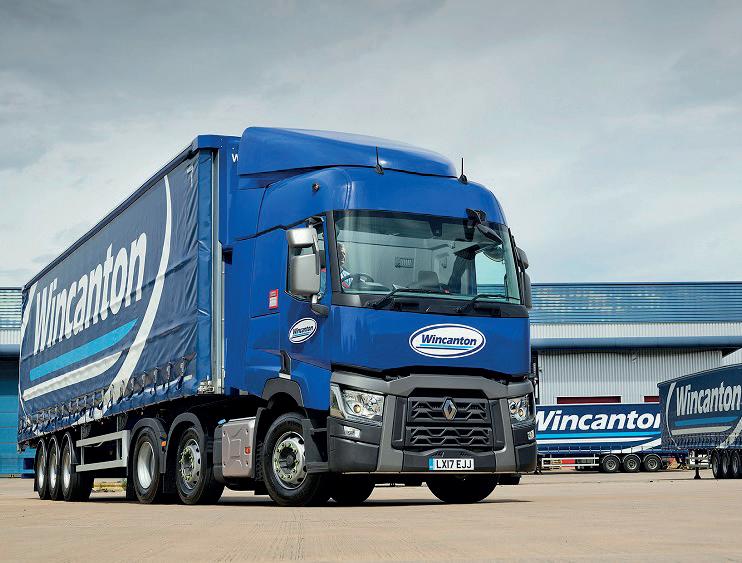
Wincanton will run a ‘through the night’ regional cross-docking operation for Howdens out of the site, enabling daily distribution services to its regional depots to improve stock replenishments and allow for a next-day service to trade customers.
This operation will see 14 Wincanton vehicles serve nearly 90 Howdens depots across Scotland, including the Isle of
Skye and Thurso in the Scottish Highlands.
The haulier said the use of crossdocks will optimise the supply
chain for Howdens, improving stock replenishment through regional hubs that supplement its depots’ core weekly replenish-
Police visit HGV drivers at Lymm Truckstop in bid to reduce vehicle and cargo crime
Cheshire Police descended on Lymm Truckstop this week to give crime prevention advice to HGV drivers and conduct targeted patrols to combat vehicle and cargo-related crime.
Working with the National Vehicle Crime Intelligence Service (NaVCIS), officers spoke to lorry drivers and haulage firms to offer advice and tips on how to stay vigilant and mitigate the risk of becoming victims of freight crime.
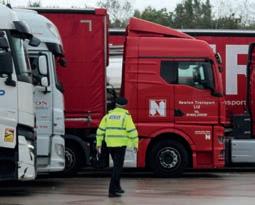
PC Danielle Goodwin, who led the operation, said: “Hundreds of thousands of HGVs use our roads
every day, with many lorry drivers choosing to stop overnight in our county – and while we try our best to ensure those that do are safe and secure, we know that there are criminals who deliberately enter
the area to target these vehicles.
“We understand the detrimental impact this can have on the haulage industry, as well as the lorry drivers who fall victim to this type of crime, and I hope this operation acts as a warning that Cheshire Police, along with NaVCIS, are working together to bring those suspected of criminal activity to justice.”
NaVCIS is a non-profit initiative that bridges the gap between policing and the industry by helping to disrupt criminality and protect communities harmed by vehicle finance crime or organised crime.
TradeChoice Carpet & Flooring refreshes fleet with 18T Renault trucks
TradeCoice Carpet & Flooring has taken delivery of 18 new 18-tonne Renault D-range trucks from Hexagon Leasing, with a 26-tonne Renault set to join them later this month, as part of its fleet renewal programme.
The company, which is one of the largest specialist distributors of floor coverings, currently operates a fleet of 74 vehicles and is a recent customer of Hexagon Leasing.
Richard Payne, TradeChoice national logistics
manager, said: "We have a dual partnership with Hexagon Leasing. They have been really helpful and assisted us in exploring our options in terms of cost, payload and efficiencies, and this is the start of us replacing our older fleet assets.
“The 18-tonne trucks are being used primarily as the customer delivery fleet and the 26T will be used for moving stock between our head office in Redditch and our UK-wide depots including Cardiff, Bristol, Manchester and Gateshead.”
ment with a next-day service.
It added that this approach frees up more time and resources for Howdens to focus on sales and service activity for its trade partners.
The new, expanded contract builds on nearly a decade of collaboration between the two companies, which has seen Wincanton support Howdens’ sustained growth with transport and warehousing services.
Carl Hanson, Wincanton MD for group transport, said: “We are delighted to house Howdens Scottish cross-docking operation at our Scotland Gateway shared user hub.
“Our partnership is built on collaborative working and operational excellence, and we look forward to realising further supply chain efficiencies over the next three years.”
Onward renews warehouse lease
Yorkshire warehousing and retail park specialist Onward Holdings has sealed a deal with Sciensus, which sees the healthcare provider renew its 10-year lease at Junction Point on the Green Industrial Estate in Featherstone.
The deal, which is valued at around £285,000 a year, will see Sciensus, formerly known as Healthcare at Home, continue with the storage and distribution of medical products in Yorkshire.
The warehouse is equipped to handle the distribution of a wide variety of medical products and is located close to J31 of the M62, as well as the M1 and A1(M) intersections and rail freight links at Wakefield Europort.
Onward Holdings director Neil Storey said: “Our tenant feels at home at Junction Point, and we’ve worked closely with them to deliver a facility that really does meet their every need. This is an excellent deal for all parties, and we’re delighted to be working together again for another decade.”





Automated route optimisation transforms Iceland deliveries – and cuts 720 tonnes of CO2
AI helps GXO to slash emissions
By Carol Millett Contract logistics provider GXO Logisticshas used the power of arificial intelligence (AI) to help food retailer Iceland slash one of its depot’s delivery emissions by 720 tonnes.
GXO operates four distribution centres across three temperature ranges, servicing over 1,100 stores nationwide on behalf of Iceland.
Since 2021, GXO has been work-
ing in partnership with Datasparq, an end-to-end AI and data science services provider.
The partnership has used Datasparq’s technology to develop bespoke route optimisation tools for Iceland's complex network, which covers over 50 million km per year.
By using AI-generated route optimisation, GXO has helped Iceland reduce the distance driven
XL and Scurri go big on deal
Two-person delivery specialist
ArrowXL and delivery management platform Scurri have forged a strategic partnership that will allow retailers to deliver bulky and larger size online orders across the country.
ArrowXL makes over 2 million deliveries on average each year, providing delivery coverage to 98% of the UK population, six days a week. It also offers a variety of in-house services, such as wet connect/disconnect, WEEE recycling and packaging removal.

Scurri provides a last-mile delivery service to retailers, through its
customisable next-generation
delivery management software.
It offers over 1,000 carrier services and 97% carrier coverage and processes over 100 million orders per annum. The company has also launched Scurri Track Plus to help retailers boost loyalty and reduce queries through branded tracking.
Craig Kavanagh, ArrowXL sales director, said: “This partnership will leverage the unique strengths of both companies, combining Scurri’s cutting-edge technology with our extensive expertise in two-person delivery services.”
from one depot by over 900,000km per year, decreasing diesel consumption by over 25,000 liters and delivering over 720 tonnes of overall carbon emission savings to date.
Gavin Williams, GXO MD, UK and Ireland, said its use of innovative technology is helping it win new customers.
He added: “We continue to invest in unparalleled technology
solutions to better serve our customers, helping them boost efficiency and productivity as well as achieve their ESG goals.
“With our continued deployment of artificial intelligence, we now have even more opportunities to add value for our customers by enhancing all aspects of their logistics needs — from sorting to picking, packing and transportation.”
Things go sour for milk delivery firms caught in roadside checks
National milk chains and delivery firms that overloaded dangerous vans and tried to circumvent O-licensing laws have been hit with huge fines.
In a DVSA-led operation, three operators and 25 drivers were found guilty of overloading, driving defective vehicles and also driving vehicles that had been banned from being used.
One van was found to be 2 tonnes overweight and roadworthiness issues included defective brakes, bald tyres, broken springs and damaged body panelling.
Some vehicles that had attracted immediate prohibitions had previously been issued with prohibitions and so were being used with known defects. Nearly all the vehicles stopped were either overloaded or overloaded with a mechanical defect.
The DVSA began a targeted operation in December 2022, with 11 road checks over nine days at various sites across the country. It said that due to the weight of milk, smaller refrigerated vehicles are generally seen as unsuitable and the goods should be transported by HGVs.
Starling Distribution Services was ordered to pay £205,660, made up of £142,160 in fines, costs of £31,900 and victim surcharges of £31,600. Freshways was ordered to pay £54,179 and Medina Capital Dairy Company was hit with a £15,300 total payout.
One of the drivers caught, Vinaykumar Jashbai Patel, a director of Starling Distribution Services, was fined £2,098. Others were issued with smaller fines and points on their licences.
Bycroft to oversee Asset Alliance development with shift to finance MD

Asset Alliance Group has promoted Michael Bycroft to the new position of MD for asset finance and leasing from his previous role as MD of bus & coach.
He assumes responsibility for the strategic development of the group and will oversee the truck and trailer contract hire, leasing and finance sales divisions, as well as the bus and coach, vendor finance and general asset finance sides of the business.
Bycroft said: “We have seen significant growth
across the business over the last few years, particularly in the bus and coach, vendor finance and general asset finance divisions.
“I want to make sure this progression continues and that we maximise our capabilities to develop all areas of the business.
“All of our budgets and forecasts point to another strong year ahead for Asset Alliance Group and I’m very confident we are putting the right stepping stones in place to allow every division to prosper.”
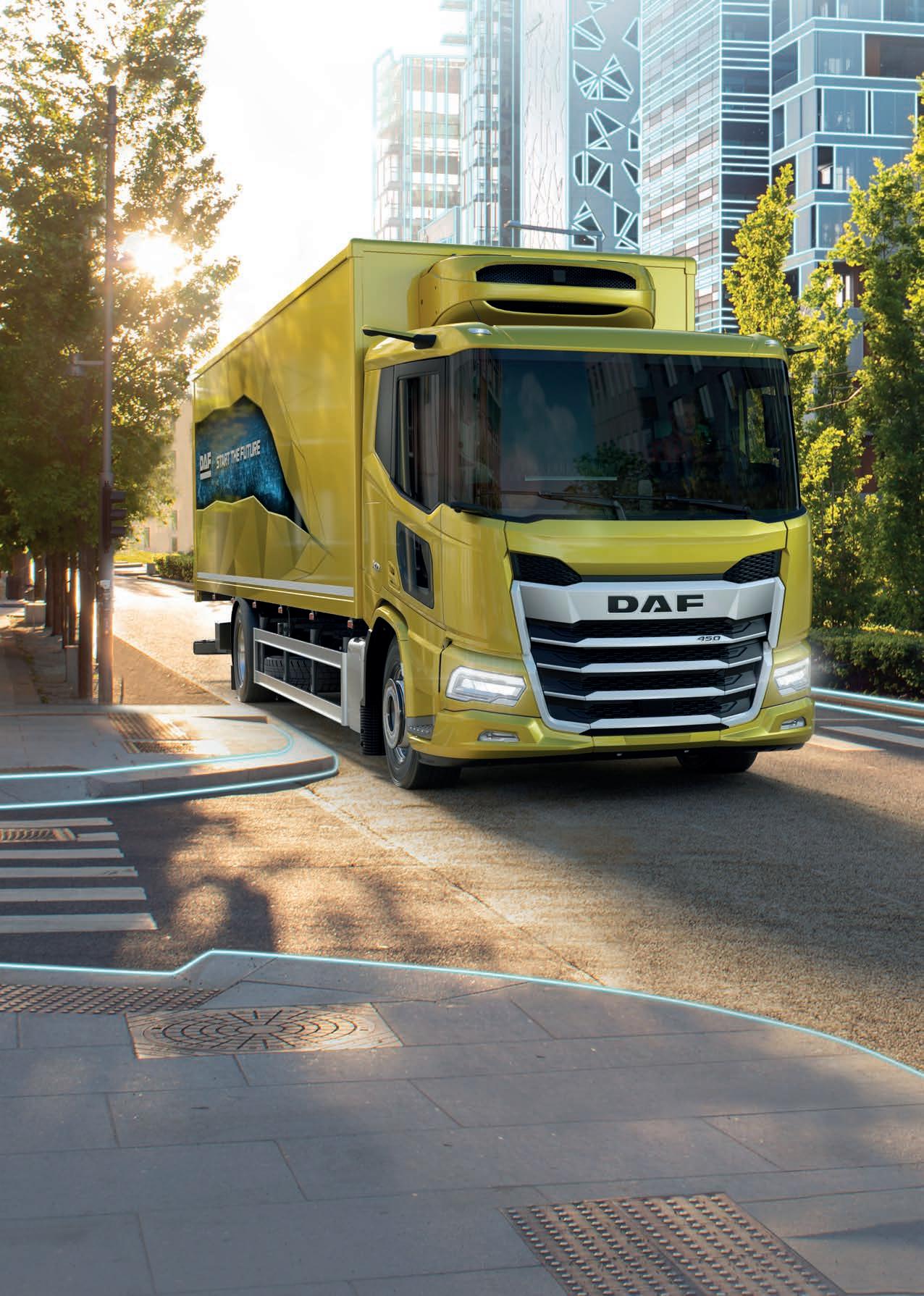



Pairing of new-generation Schmitz Cargobull trailer with Volvo FM Electric is emission-free first COOL runnings for Manfreight
By Carol MillettUK
and European logistics firmManfreight has taken delivery of the first Schmitz Cargobull S.KOe COOL to be put into operation in the UK.
The fully electric semi-trailer will be paired with a Volvo FM Electric, providing the County Armargh-based company with a zero-emission solution for its temperature-controlled division.
Chris Slowey, Manfreight MD, said: “The introduction of the S.KOe COOL is an exciting milestone. Working in tandem with the Volvo FM Electric, we can now offer our customers a completely electric transport combination.
“It’s a major commitment and a clear sign that we are incredibly serious about our ambitious target
Prohire talks up private equity
Prohire welcomed Jo Gideon, MP for Stoke-on-Trent Central, to its headquarters in the city to learn how private equity is fuelling its ambition to lead the charge in sustainable vehicle hire.
Prohire currently employs over 80 people across its Stoke HQ and its depot in Tunbridge Wells, and has invested in a new vehicle maintenance unit at each site since 2018, when NorthEdge Capital acquired a majority stake via a management buyout.
Chief executive Jay Edwards said: “Thanks to NorthEdge’s backing we’ve been able to invest in local people, systems and sustainable infrastructure, which will allow us to achieve our potential at a faster pace than we could do alone.”
In 2021, Prohire launched its sustainable hire and alternative fuels division ProGreen to support its customers in achieving their net zero ambitions. Last year ProGreen supported over 450 businesses in developing their fleet ESG strategy.
to run an emission-free operation by 2045.”
Colin Maher, Schmitz Cargobull UK & Ireland MD, said: “The S.KOe COOL is the ideal solution for companies like Manfreight who are leading the charge towards a cleaner and greener transport sector. As a long-standing partner of Schmitz Cargobull, we are happy to be able to support them with a truly sustainable solution for their temperature-controlled business.”
Manfreight will use the S.KOe COOL to transport refrigerated products, including pharmaceuticals and raw food products, to its large customer base across the whole of Ireland and into mainland UK.

The emission-free semi-trailer
comes equipped with an all-electric refrigeration unit with integrated power electronics, a highvoltage battery and an axle
generator. It is also extremely quiet, enabling deliveries in urban areas in the early morning hours as well as in the late evening.
Pallet-Track names Goodman as chief exec
Pallet-Track has appointed parcels expert Stuart Godman as its new chief executive, bringing with him more than 30 years of logistics sector knowledge.
DVSA in ‘crumbly concrete’ search
The DVSA said it was in the process of identifying which of its buildings, including those used by the traffic commissioners, were affected by weak concrete.

After more than 100 schools were told to shut just as the new school year was starting when reinforced autoclaved aerated concrete (RAAC) in the buildings was found to be deteriorating, experts warned that the scale of the problem was much wider and affected many more public and private buildings than educational establishments.
Harrow Crown Court, which was built in 1991, was closed last month after RAAC was discovered during improvement works to the roof.
Research carried out by Loughborough University found
police stations, law courts, libraries and office blocks could all be affected.
The university said the next phase of research was to look at the best ways to assess and grade the risk of RAAC failure, and on the most effective action to ensure RAAC in buildings was safe.
Professor Chris Goodier said: “It is important that the concerns around RAAC are not overstated. There is nothing from our research to indicate that RAAC fails immediately after 30 years, or that it is a dangerous material.
“What our research does show is that RAAC that has been poorly manufactured, installed or maintained is at greater risk of failing.
“The task we now face is to find out where RAAC is in buildings and assess the state it is in.”
Godman replaces Caroline Green, who is stepping down after two and a half years in the role.
Pallet-Track said his primary focus will be to deliver growth for the network as it enters its 20th year in business.
Godman said: “The company is already a renowned name in the sector, but we have further ambitions to grow the brand, adopt new technologies and increase service levels for our valued shareholder member network.”
Godman has previously held senior positions at Absolutely, Connect Group, DX Group, Target Express and TNT Express.
Pallet-Track chairman Tony Rieger said: “We are very pleased to announce the appointment of Stuart Godman to the role of CEO and with his extensive background in the logistics and transport industry. With sustainability and technology high on customers’ agendas, his experience will be invaluable as we continue to future-proof the business.”

Pall-Ex Group’s investment in subsidiary Fortec has helped it to grow and become profitable Partnership marks three years
Northampton-based pallet network Fortec Distribution has celebrated its three-year milestone as a Pall-Ex Group subsidiary.
Announcing the milestone, Pall-Ex said that, since being acquired, Fortec had received a number of major investments and been allowed to “retain the agility of a smaller network” while benefitting from the experience and resources of Pall-Ex.
The group highlighted Fortec’s most recent EBITDA profit, which amounted to £286,000 in the year to July 2023, pointing out that it was losing over £2.5m per annum prior to acquisition.

Pall-Ex said it had also invested in major improvements to Fortec’s Watford Gap hub, including a fleet of 36 new forklift trucks worth over £250,000 and a £180,000 upgrade to the roof of its 210,000 sq ft warehouse.
Further improvements are
planned, which will see Fortec’s hub capacity increase by an additional 2,000 pallets per night. The pallet network has also been connected to Pall-Ex’s Nexus IT platform, which the group is continuing to enhance.
Pall-Ex Group said one of the biggest changes over the past three years had been the introduction of the shareholder model.
Brocklehurst Transport, Team C Express Logistics and Devereux Transport become some of the first hauliers to sign up, taking the opportunity to acquire shares in the business and have a say in how it operates.



Fortec Distribution, which now has over 60 members, has also benefitted from access to Pall-Ex Group’s international network and services such as Parcel Pallet – a compact pallet supporting loads up to 150kg that aims to provide a cost-effective, efficient and secure way to send large and
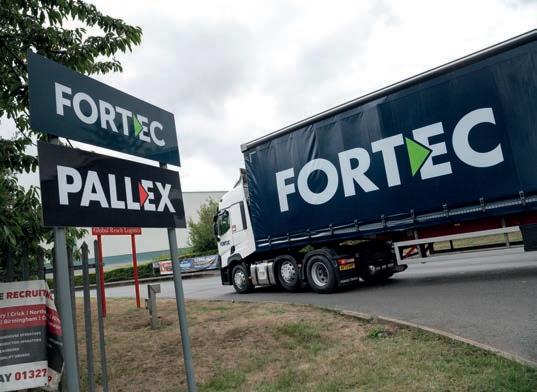

multiple parcel consignments.
Barry Byers, Pall-Ex Group MD of UK business units, said: “It’s been great to watch Fortec Distribution and its members thrive over the past three years.
“Our commitment to our
members is our highest priority, so every investment made into Fortec has been worthwhile as we continue to watch the network grow. It’s been a fantastic partnership to date and I’m excited to see what the future holds.”



Logistics UK finance forum puts focus on government policy as the industry tries to decarbonise
The quest for clarity
By Steve HobsonWhile the logistics industry does not need more government handouts to fund the move to net zero carbon emissions, it does want more clarity and certainty over key policy decisions to enable the industry to make the huge investments that will be needed with confidence.
That was the message from Logistics UK’s first finance forum, sponsored by Demica, held in London on 12 September.

Introducing the event, Logistics UK president Phil Roe said that the sector was facing some shortterm challenges as a result of a stagnant economy and declining volumes, with the hire and reward sector under particular pressure. At the same time, operators needed to find “significant funds” to invest in areas such as skills, decarbonisation and productivity to ensure the long-term health of both the industry and the wider UK economy – which depends so heavily on logistics.
Logistics UK policy director Kate Jennings added that 8% of UK jobs were in logistics but that the government “takes it for granted”.
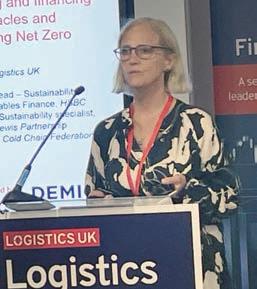
“People only think of us when there is a problem,” she said. “We are not asking for more government money but we need to work together.”
Choices on hold
The private sector investment needed is being delayed because of economic headwinds and uncertainty. Evri has tripled in size over the past three years to become the UK’s largest parcels delivery network, with 7,000 employees and 20,000 self-employed couriers delivering 700 million parcels last year.
Alan Richardson, Evri chief financial officer, said that, as a result of the Covid-19 pandemic, uncertainty over government policy on self-employment and now rampant inflation, “some of our bigger investment choices are now on hold” and the company is having to “think about where we put our big bets on carbon reduction and the labour market”.
“We opened our biggest site in Barnsley in 2022 and once we had decided to do it, it was relatively pain-free,” he went on. “But we don’t have another lined up
because we are unsure about future growth. We need more confidence and certainty to make those decisions.”
Evri now has three hubs and 25 depots and finding sites for more depots in London was a “struggle”, Richardson added. “It’s doable, as there are sites – but they are expensive.”
The location of big warehouse developments is also facing growing uncertainty as pressure from operators looking to install more automation and charge electric vehicles (EVs) increases the demand for electricity.
Charles Blake, senior director in the logistics team at property developer Segro, said that in the past few years the market had been “electrified” by Brexit and Covid-19, with significant growth in demand for large warehouses.
Power requirements were growing for large sheds and one obvious solution was to install solar panels. But Blake said that the electricity distribution network was not set up to handle exports of electricity, which these sites sometimes would do when solar power output exceeded demand on site.
“It doesn’t work if we can’t export,” he said. “On a large site the solar installation might be 30MVA but the average draw is only 7MVA to 8MVA. Charging for electric HGVs will be crucial and national policy is not dealing with
it. We need more co-ordination, not more money, from the government.”
For global businesses such as DHL Supply Chain, the UK operation has to compete for investment with other countries, said Becky Taylor, the giant 3PL’s chief financial offer for the UK and Ireland.
“We employ 40,000 people here but I need to put the UK at the forefront of global decisions,” she said. “ESG [environmental, social and governance] is a massive theme for us. This is a real step change and we need to make big investments to reduce emissions.”
She also called for more “certainty and stability” in government policy because investment horizons were 15 to 20 years and the upheavals in UK government
policy of recent years made it difficult to secure funding.
While some in the industry call decarbonisation a challenge, others – including Volvo Trucks public affairs director Simon Villanueva – prefer to see it as an opportunity.
Here today
“This technology revolution is probably the biggest since the invention of the wheel – or at least the internal combustion engine,” he said. “It is extremely difficult and complicated to decarbonise.
“But each truck emits 220 tonnes of CO2 every year. It can’t continue. EVs have a part to play in making your business more efficient and they are here today, not pie in the sky.”
Villanueva also criticised government policy on the plug-in truck grant. “A battery electric truck is twice the price of a diesel so we get a £25,000 grant – but then we are charged a £25,000 import tariff,” he said. “That has to change.”
He also said operators were being put off buying electric trucks because everyone expected the next generation to be a lot better. “That is true, but if an EV will work now it will work tomorrow,” he argued. “Range is not really a challenge for certain use cases and you need to get ahead of the curve. This is not a fad.” n






































A vision of the future
Updated guidance and technical standards for the new Direct Vision Standard (DVS) have now been published, as TfL forges ahead with its plan to eliminate all deaths from the capital’s roads by 2041.
From 28 October 2024, HGVs over 12 tonnes GVW operating in the capital will be required to have a minimum three-star DVS rating or fit enhanced safety features –known as the Progressive Safe System (PSS).
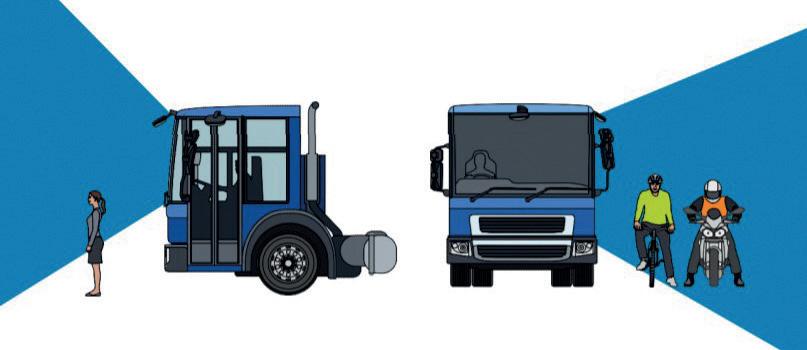

TfL said it would work with the industry and monitor their readiness to fit the new PSS measures and that it was also providing a three-month grace period from the 28 October deadline to enable operators to comply.
“Since we introduced London’s pioneering DVS, we have seen a dramatic reduction in fatal collisions where vision is a contributing factor,” said Christina Calderato, TfL director of transport strategy and policy. “However, there is much more we need to do to achieve our goal of eradicating deaths and serious injuries from
Chris Tindall reportsLondon’s transport network. We will continue to take every possible measure to do so and our updated guidance and standards for the DVS scheme is a key part of that.”
Time pressure
But the industry’s two biggest trade associations have expressed concern at the new rules and said it would be “impossible” for hauliers to prepare and be ready in time.
In a joint statement, Logistics UK and the RHA said they were disappointed TfL had not taken into account the concerns that had previously been expressed by industry.
“Both organisations are fully committed to improving the safety of all road users, and putting in place workable solutions that reduce the risk of road fatalities,”
the statement said. “However, the industry has already raised concerns over the proposed changes to the scheme, which will place a huge onus on operators, with no regulatory oversight from TfL and no accreditation process for the new regulations.”
It added: “Both trade bodies reiterate their support for the Mayor’s Vision Zero road safety strategy, including continuous improvements to ensure the safe operation of vehicles.
“But short lead-in times, a lack of available kit and a dire shortage of qualified fitters for it will make it impossible for the industry to prepare and be ready for the changes next autumn.”
Jacqui O’Donovan, MD of O’Donovan Waste Disposal, said its fleet already complied with a minimum three-star rating, but the additional costs would result in a lot of independent and smaller hauliers leaving the sector, after having already endured the ULEZ and Covid-19.
“The logistics industry is an easy target for speedy change and collectively as a sector, we do not seem to have a big enough voice to get the ‘powers that be’ to listen to what our needs are,” she said. “We all want safer roads and
cleaner air but we have to be realistic about what can be done and when it can be done.
“The life cycle of lorries is normally eight to 10 years and these changes would equate to approximately a three-year cycle, which is financially suicidal for hauliers.”
All change
Emily Hardy, marketing manager at Brigade Electronics UK, said operators that have had equipment fitted to their vehicles in order to comply with the current DVS standards will now need to replace it, even if they have only had it for a year or less.
“The new regulations require more advanced technology,” she said. “For instance, the previous safe permit required obstacle detection systems on the nearside, but the Progressive Safe System requires technology that predicts collisions based on the trajectories of the vehicle and the vulnerable road user, to calculate if a collision is imminent.
“There is also a specified alarm strategy to warn the driver of the severity of the situation. If the vehicle and vulnerable road user (VRU) are travelling in the same direction on a parallel path to each other, they can continue to do so for an infinite time, even if they are in close proximity.
“This does not constitute an imminent collision and therefore the driver would not need to receive an audible warning.”
Hardy said this means
➜
Long-awaited guidelines for the next phase of London’s Direct Vision Standard have been published, but do they go too far, too soon?

drivers familiar with older VRU detection systems would need additional training so that they were clear how the systems worked.
“The PSS also requires a sensor system at the front,” she added. “This was recommended in the safe permit, but not mandatory and so few operators fitted it.
“The front system requires two alarms; one when the driver detects a VRU when preparing to move off and one when the vehicle detects a VRU as it has begun its forward manoeuvre.”
Carl Milton, cement logistics manager at Cemex, said it expected to be fully compliant with the new DVS rules, but he added that the same could not be said for many smaller construction hauliers. “If it goes ahead then there’s going to be a massive scramble to buy and fit this additional equipment,” he said. “They’ll struggle to get the star rating. Unlike supermarkets, you can’t do last mile work any other way.
“Construction work tends to be in the city centre in daylight hours. You can’t get away from that fact when you are constructing a building and you need materials delivered to the site; you can’t often do it out of hours.
“And mixer trucks tend to do around 50 miles a day, if that. So when you take into account their life cycle it’s an expensive piece of kit to buy.”
Nigel Ponton, engineering manager at Cemex, added that the mixer market was largely made up of smaller businesses with one or two trucks, which typically could be between three and five years old. “To spend between £2,000
CAPITAL EXPEDITURE
and £3,000 to upgrade to this new equipment to reach the standard when they are already struggling in the market is a tall order,” he said. “There’s no consideration given to their life cycle.”
But, as Milton also pointed out, it’s not just the cost that will be giving hauliers a headache. “It’s the availability of the equipment,”
TfL believes there are currently just under 245,000 vehicles that are affected by its forthcoming enhanced DVS requirements – and based on recent trends it expects this figure to gradually increase in the weeks to October 2024.
A spokesperson for TfL said this can be broken down into 160,028 zero-star rated lorries, 61,284 one-star lorries and 23,489 two-star lorries.
TfL did not say how it expected all these operators to find the time and money to invest in the new equipment before the deadline – and opinion in the industry appears mixed on whether TfL’s October 2024 deadline might slip.
“Everyone is saying TfL will have to back off; it’s an unrealistic time scale,” said Milton.

However, O’Donovan said: “I don’t believe so, as historically when taking part in these consultations, industry concerns have not brought about much change to proposals - so I feel this one won’t be any different.

Hardy said over 15,000 HGVs a month will need to be upgraded, meaning that there would
he said. “If you have the money then fine, but can you get it fitted in the timescales?
“I don’t think anyone is arguing with the direction of travel. It’s a fantastic idea, it’s just the timing of it.”
The industry’s trade associations said hauliers required certainty to understand what was expected of
undoubtedly be supply and fitment issues. “This is why we campaign for a phased approach,” she said.
So, given the logistical and financial challenges, will some operators choose to turn their back on the capital? The evidence suggests not.
TfL said it does not hold any data of companies that opted not to operate in London when the scheme was first launched in 2019, but its spokesperson added: “The numbers of vehicles obtaining an HGV safety permit continue to increase steadily: for example zero star permits have increased from 112,259 in February 2022 to 160,028 in August 2023, suggesting that there is no significant trend of companies ceasing to operate in London as a result of the DVS.”


Milton said: “Some hauliers are trapped in that market. You are a franchised haulier, you have bought into that model and you are operating in that area. To up sticks and operate in another part of the country is just not viable.”
TROUBLE AHEAD: While large operators such as Cemex expect to be DVS-compliant, its engineering manager Nigel Ponton (left) warned upgrade costs could severely impact smaller firms
them by TfL and it is also demanding assurances that further changes to the DVS will not be necessary once the new equipment is installed.
Hardy advised operators to spread the cost by fitting the nearside equipment now – which meets current DVS requirements – and add the front system at a later date. She added: “We continue to advocate for a phased approach to include extending permits for those with existing equipment, especially if it’s less than two years old, and concentrate on vehicles with no equipment fitted.
“With the fitter shortages and sheer volume of vehicles that will need to be retrofitted by October 2024, the industry will struggle to meet the deadline.” n
AGAINST THE CLOCK: Cemex’s Carl Milton and Brigade Electronics’ Emma Hardy warn of the tight timescale for compliance






Delaying EVs to win votes
We should not be at all surprised when politicians do things for purely political reasons. We can be disappointed, angry even, but not surprised.
Steve Hobson Editor Motor TransportSo when No 10 leaked the news to the BBC that the prime minister was considering rowing back on some of his predecessor’s green commitments –probably to gauge reaction among voters and, just as important, Conservative MPs – to win a few votes, it should have come as no surprise.
Ever since the surprise Conservative victory in the Uxbridge by-election was put down to the Labour London mayor’s unpopular decision to extend the ULEZ out to the M25, it has been clear that the Conservatives saw an opportunity to claw back some much-needed popularity among voters ahead of the next election by scrapping unpopular environmental measures.
So no surprise when, 24 hours after the ‘leak’, the PM announced the ban on sales of new petrol and diesel cars and vans would indeed be put back five years to 2035 – still five years earlier than the original 2040 date that Boris Johnson chose to bring forward 10 years to 2030 for some reason only he really knows.
Of course, if the current PM really wanted to head off serious damage to the economy, he would have also have delayed the ban on diesel trucks by five years to 2045 – but politicians care little for the freight transport industry and only pay it any attention when there is no petrol or loo rolls.
While electrifying cars and vans can’t be described as easy – mainly due to the woeful lack of charging infrastructure – it is a darn sight easier than trying to electrify HGVs by 2040. If recharging cars and vans is looking a bit tricky, then finding a way to recharge 400,000 electric HGVs in less than 17 years seems nigh on impossible right now.
Alternative fuels offer ready solutions
 Gaynor Hartnell CEO, Renewable Transport Fuel Association
Gaynor Hartnell CEO, Renewable Transport Fuel Association
For today’s long-haul trucks, viable zero emission tailpipe solutions are not yet readily available. That does not mean you can’t act. Switching fuels in your existing fleet can deliver significant carbon reductions, in some cases greater than for BEVs or hydrogen fuel cell vehicles. No vehicle fleet is identical, but as a general rule it’s the heaviest long-haul vehicles that pose the biggest challenge. The low-carbon options available are biodiesel, HVO (hydrotreated vegetable oil) and biomethane – which one of these makes best sense will depend on the nature of the businesses and the duty cycle of the fleets. As a broad generalisation:
n Biomethane is best when operators need to purchase new heavy, long-haul, trucks for high-intensity use;
n High blend biodiesel is the fuel of choice for haulage companies, whose day job is making a profit from transporting freight – particularly for vehicles already in service;
n HVO is the easiest fuel switch to implement as it is a straightforward drop-in replacement for B7 DERV. Consider this when the cost of fuel isn’t the factor driving the decision.
An excellent source of information is the Zemo Partnership’s Renewable Fuels Guide published in July this year and its Renewable Fuels Assurance Scheme list of reputable fuel suppliers.
OEMs tend to sell biodiesel-compatible vehicles now, or give buyers the option of buying high- blend-compatible versions for a small extra cost (around £500). With fully compatible vehicles biodiesel can be blended at any level up to 100% (B100). A search for the ‘Approval list of engine and commercial vehicle manufacturers’ will
reveal which are compatible with high blends of biodiesel.
The use of B20 (20% biodiesel blended with standard diesel) entails a reduction of around 27% in CO2 emissions, requires no changes to existing infrastructure or maintenance regimes, and with little to no cost increase. B30 entails more frequent oil filter changes and B100 will require heated fuel storage tanks and fuel lines.
Biodiesel is a renewable fuel made from used cooking oil, waste animal fats and greases and other lipids. It can be made from purpose-grown oilseed crops, but this is not favoured. Palm oil is to be avoided, due to the potential for deforestation. CO2 emissions from 100% biodiesel are up to 90% less than fossil diesel.
HVO is made from the same feedstocks, but needs more processing. The end result is a fuel which is equivalent to standard diesel. It is a total drop-in fuel and achieves similar GHG reductions to biodiesel. This convenience comes at a cost, as HVO is typically around 20% more expensive.
A move to biomethane means buying a new truck (around £25,000 more than a diesel version) but the fuel is cheaper. A 44-tonne double-shifted gas truck can achieve a payback in less than a year.
Moving to better fuels is not an alternative to zero tailpipe vehicles, but fuel switching gives instant greenhouse gas reductions. Given that the effect of CO2 is cumulative, savings today are worth much more than those tomorrow.
Got something to say?
If you would like to contribute to MT’s Viewpoint, email steve.hobson@roadtransport.com
The newspaper for transport operators
To contact us: Tel: 020 8912 +4 digits or email: name.surname@roadtransport.com
Editor Steve Hobson 2161
Head of content Tim Wallace 2158
Events and projects editor Hayley Tayler 2165
Group production manager Isabel Burton

Senior display sales executive Barnaby Goodman-Smith 2128
Event sales Tim George 0755 7677758
Classified and recruitment advertising rtmclassified@roadtransport.com
Sales director Emma Rowland 07780 604075
Divisional director Vic Bunby 2121
MT Awards Katy Moyle 2152
Managing director Andy Salter 2171

Editorial office Road Transport Media, First Floor, Chancery House, St Nicholas Way, Sutton, Surrey SM1 1JB 020 8912 2170
Free copies MT is available free to specified licensed operators under the publisher’s terms of control. For details, email mtsccqueries@roadtransport.com, or call 01772 426705
Subscriptions
RoadTransport@abacusemedia.zendesk.com 020 8955 7034
Motor Transport Subscriptions, Abacus, 107-111 Fleet Street, London EC4A 2AB
Rates UK £156/year. Cheques made payable to Motor Transport. Apply online at mtssubs.com
Registered at the Post Office as a newspaper
Published by DVV Media International Ltd © 2023 DVV Media International Ltd
ISSN 0027-206 X


Next generation
Logistics professionals have won further funds to spread the word about opportunities in the industry to young people. Steve Hobson reports

Generation Logistics secured a further £300,000 of DfT funding for its second year to continue raising the profile of logistics in schools and colleges, by supporting educators with resources and materials, as well as talking directly to young people and other potential recruits to the sector by continuing a heavyweight social media campaign. Transport secretary Mark Harper MP announced the second tranche of funding by video link at Road Transport Expo 2023 in June.
As in year one, when the DfT invested £345,000, this public funding will represent under a third of income, with the majority coming in sponsorship from logistics companies and trade associations.
Launched in August 2022, Generation Logistics is a ground-breaking collaboration managed by the CILT (UK) and Logistics UK supported by the DfT, more than 30 leading companies and 17 trade associations including the RHA and UKWA.
An Ambassadors Network has also been established, with now over 290 logistics professionals working to inform and inspire new talent through events and engagements.
To date, the campaign has:
■ Reached an audience of over 460 million people
■ Generated over 650,000 visits to the Generation Logistics Hub to see information about logistics and opportunities within the sector
■ Resulted in over 3 million engagements with interested individuals on social media alone
Phil Roe, executive sponsor of Generation Logistics, welcomed the DfT backing.
“It is fantastic news that the DfT has committed to supporting Generation Logistics for a further year and is recognition of the results we have achieved so far,” he says. “This support lays the foundations for the campaign to push into its second year at what is a critical time for the industry.”
Roe, who is also president of Logistics UK and a board member of the CILT, has over 25 years’ experience in the logistics sector, including 18 years with DHL Supply
SOMETHING FOR EVERYONE: The industry needs skilled people at all levels, from drivers to maintenance technicians
Chain. He tells MT how Generation Logistics came into being.
“The original idea for a campaign to raise awareness of logistics as a great place to work came from a discussion that David Wells [CEO of Logistics UK] had with Grant Shapps MP, [then transport secretary] in early 2022,” he says. “That was partly because we’d seen the success other sectors have had doing similar things.
“Also, I think it was a general feeling that the sector had been hiding its colours for too long. As a critical sector underpinning the rest of the UK economy, we need to get out there.”
Spirit of co-operation
The transport and logistics sector has long been bedevilled by a silo mentality, with each trade association ploughing its own furrow, but a new spirit of cooperation – especially since Richard Smith took over as MD of the RHA in January 2022 – meant that the CILT and Logistics UK could go to the DfT and speak on behalf of the whole industry.
OPPORTUNITY KNOCKS: Megan Charlton (left), lead HR advisor, and Freya Clark, human resources graduate associate at GXO Logistics, telling year 12 students at their former secondary school about their careers in logistics

“We took a decision fairly early on to do this in a very collaborative manner,” says Roe. “The approach to setting up the campaign with the DfT was that the CILT, which is a charity operating a ring-fenced financial arrangement, would work with Logistics UK to create collaboration across all different areas of logistics, from private operators to public sector bodies and trade associations.
“Fundamentally, Generation Logistics is an awareness campaign supported by the government, but overwhelmingly financed by the private sector, to raise awareness of the great careers and opportunities that exist within the industry.”









Skills shortage
In its first year Generation Logistics raised just under £900,000 from industry sponsors, and it is looking to raise a slightly smaller sum in year two, as the setup costs were all in the first year.

“The project has a steering team made up of a number of the gold sponsors,” he goes on. “Ultimately, it has a reporting line into the DfT as well, because they’ve put quite a bit of money into it. We haven’t set it up as a separate company or anything like that, mainly because there was no need to.
“It’s a project using the best of abilities across the sector.”
The programme is managed by Bethany Windsor, who has been at CILT(UK)for six years and for nine years was a committee member at Women in Logistics UK, a forum of CILT(UK) that works to connect, engage and inspire those working in the logistics sector.
Direct communication
Windsor also oversees the management of the NOVUS programme, which brings together ten leading UK universities with students wanting to study for logistics and supply chain degrees and 19 sector-based sponsoring companies. She was also briefly the liaison between social mobility charity Career Ready and Think Logistics, the forerunner to Generation Logistics founded by Abbey Logistics chairman Steve Granite in 2013. Two full time members of staff have been appointed to handle PR and marketing, supported by a digital marketing and PR agency, ilk, focusing on direct communication to consumers of all ages.
But a major element in the programme remains giving logistics professionals the tools to go out to schools and colleges to evangelise about the careers available in the industry, part of the programme which will be expanded in year two of the campaign to include the creation of educational materials for a range of core subjects.
“In December we invited people to come and be an ambassador for the programme,” says Roe. “We have about 290 of them at the moment. Where we get requests to work with schools on careers days we send those volunteer ambassadors to attend or run events.”
Teachers often welcome outside assistance in creating lessons that address parts of the National Curriculum in subject areas they are not always familiar with.
“Those lessons can be used across the whole of the UK. They will be free and available for teachers to be able to download into their subject areas,” says Roe. “We’re aiming at the years coming into GCSEs to create more understanding and insight into logistics in the first instance.
NOT JUST FOR THE BIG BOYS
In its second year, Generation Logistics wants to attract more smaller operators as sponsors and to get more involved in the project.
“We’ve deliberately made a move to offer a much lower cost sponsorship route for smaller companies,” says Roe. “Most of the sponsors in the first year – not all of them, but a lot of them – were larger companies. We want to see that broaden and many more smaller companies coming in which is why we’ve said that companies with turnovers of less than £20m will be able to sign up for the year as Silver sponsors for £2,000.”
Becoming part of Generation Logistics enables smaller operators to get their ambassadors into local schools and allows them to create social media content such as videos of younger members of staff extolling the benefits of working for the firm.
“You get the opportunity to get your people talking about what it’s like working for a smaller company in the industry as well as the guys working for a larger company,” says Roe. “Those case studies and that material then become public.
“For many of the smaller companies, they’re never going to have the opportunity to do that. We provide the ways of being able to capture that, of recording it, and then publicising it in a way that a small company is very unlikely to be able to do for themselves.”
“The second thing is that there is a really big gap in careers advice in schools. There’s nothing for the educators and the teachers that explains the great roles that exist within logistics. We created a careers guide for logistics using case studies from the sponsors. These are real people, most of them young people, talking about their jobs.”
As many transport company MDs know, gaining access to teachers can still be a challenge as many people within a school may be involved in the decision-making process.
“Those two things combined are great, but how do we get them into the schools?” asks Roe. “Getting into schools consistently has been a massive problem. What we’re in the final stages of concluding at the moment are arrangements with two really powerful organisations that have presence, effectively, between them, across all schools in the UK.
“That means that we will be able to get to teachers with a consistent message backed up with resources that they can use to promote logistics to young people in a way that we’ve never been able to do across all schools.
“We’re not trying to boil the ocean here because I think we need to resist the urge. We’re not aiming at primary schools this year, we’re really focusing on the GCSE years and older, so age 13 through to 24.”
Generation Logistics needs more logistics professionals to devote time to becoming ambassadors and going into their local schools to provide careers advice – even if their employer is not a sponsor.
“About 50% of our ambassadors come from our sponsor organisations,” says Roe. “What’s been really
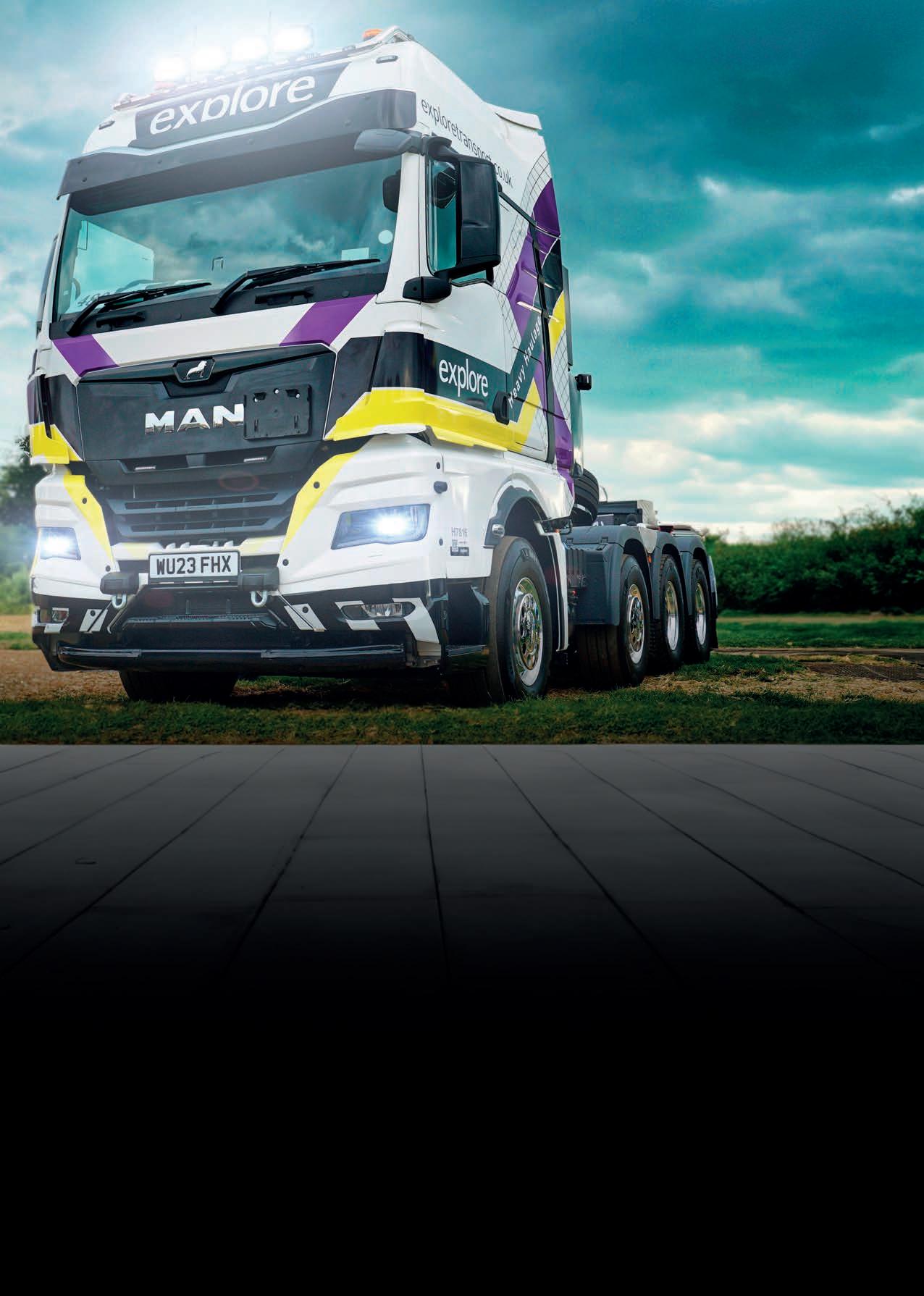



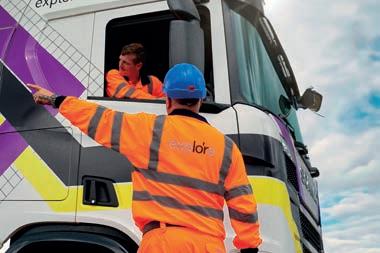

interesting is the other 50% don’t, they’re people who wanted to get involved. We set up a LinkedIn page to do that, also co-ordinated through the CILT, to pair up opportunities with ambassadors.”
As well as in-person visits, the project has had a lot of success with online sessions, which can involve parents as well as students and teachers.
“Going into schools and getting schools to come into logistics facilities is important, but we’ve had some really good attendance on logistics-themed online events already,” says Roe. “We know that parents are one of the big three influences on young people’s career choices, the other two being social media and careers advice from schools and teachers.”
Social media is a notoriously difficult space for corporates to work in, so how will Generation Logistics make it work?
“By not being corporate!” laughs Roe. “The reason why we selected ilk when we first started the programme is because they’re a young, quite small agency that really challenged us to not be corporate.
“They work closely with the team. Then take input, a lot of video case studies – over 100 now – from the sponsors, so that we can get real people talking in real language rather than it looking corporate.
“The tailoring of the campaigns, the posts and the video content is all put together for us by ilk and is specif ically designed to attract that target audience. It’s done in ways that create curiosity, and create a reaction.”
While the number of views isn’t quite in Beyonce territory they are impressive for a logistics awareness campaign.
“The numbers just go up and up and up,”
WISE INVESTMENT: Transport secretary Mark Harper MP announced the second tranche of funding by video link at Road Transport Expo in June

says Roe. “We’ve had over 3.3 million engagements with our social media campaign. That’s people actually doing something, either liking or sharing or following through. That’s only happened because we have made an effort and deliberately focused on the voices and faces of young people, and the messages of real people talking about real jobs with a bit of passion. That’s what works really.
“We’ve got young drivers on there, people who work in warehouses, project managers, and people who work in sustainability. We’ve got people who work for logistics operators and also people who work for retailers. There’s a real variety in there and that’s what captures people’s imagination and creates curiosity.”
Key messages
While a lot of attention was focused last year on the HGV driver shortage, logistics needs people at all levels.
LEADING ROLE: Roe emphasises that Generation Logistics is about raising awareness of what the industry has to offer

“One of the key messages is that there is something for everybody here,” says Roe. “It doesn’t matter really about educational attainment. There are roles in logistics for different personalities and different interests. We’re not trying to campaign or recruit. What we are trying to do is to show the variety of roles that exist within the industry.
“We agreed with the sponsors quite early on to use a number of job families to simplify things for people coming to it fresh, so they didn’t have to already know logistics to understand the job adverts.
“We have 14 different job families. The core operational job families are around transportation, warehousing and infrastructure. Because we have Network Rail and National Highways among our sponsors. Underneath that, we give them examples of roles within a job family and of the starting salaries for those as well.
“Then around those core operational roles, we then have all the support functions, including finance, HR and sustainability plus engineering and technical skills, which is one of the areas that we are seeing shortages.” n

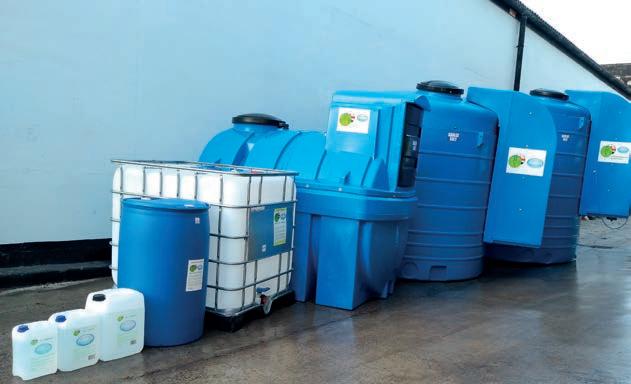














Investing in good data
Cheap tachograph software may seem like a bargain but it could cost you much more in the long run.
Steve Banner looks into the options
Too many transport companies are relying on cheap tachograph analysis software that they have purchased online from who-knowswhere and which does not work properly. So says Andrew Miles, managing director of AS Miles Consulting, which specialises in assisting operators with compliance.
“They’re buying themselves false comfort,” he contends. “The products they have bought might have a couple of lovely colour graphics, but the reports they produce tell you nothing, and there is no backup,” he observes. “If there is a problem, and you don’t happen to be an IT whizz, then you’ve got nowhere to go.
DIRECT TO DRIVER: Nijman Zeetank provides its drivers with the TruControl app, which feeds their tachograph information back to them and helps to reduce infringements
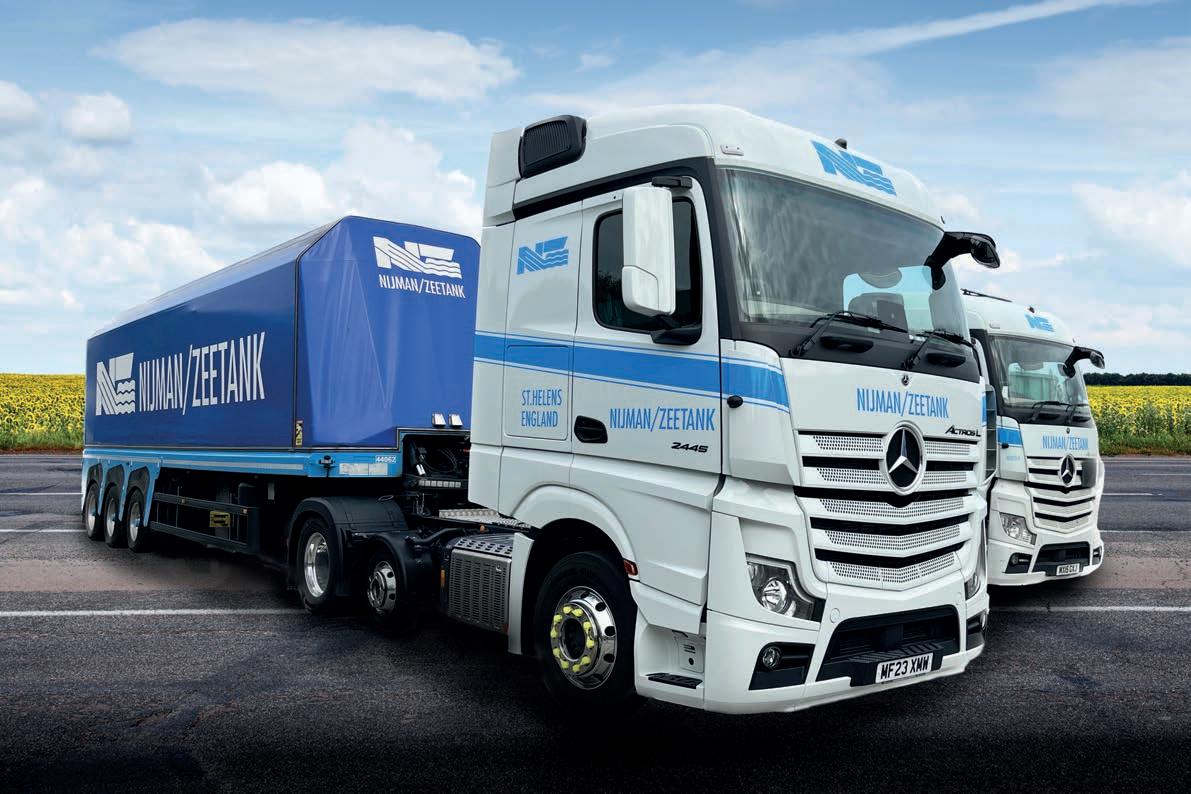
“I know of one operator who bought one of these packages and needed to ring the emergency helpline only to discover that nobody on the other end spoke English,” Miles continues. “Hauliers load them onto their computers, then if the hard drive goes bang for some reason, they find they can’t get at the data. This usually happens when they’re about to appear at a public inquiry.”
Cause for concern
TruTac managing director Jemma James is equally concerned. “There’s a lot of cheap plug-and-play software out there that you can download or even buy on a CD,” she says. “Its value is questionable, to say the least.”
Miles has visited operators using software with graphics which he says look as though they have come off a Nintendo game console from the 1980s. “One we saw a few months ago looked like Ceefax pages,” he says.
“We recently worked with an environmental business running a mixture of 7.5- to 26-tonners, which was in front of the traffic commissioner,” he continues. The company had no idea whether it was compliant with the drivers’ hours rules or not because of the product it had been sold.
“They didn’t know how to use it, they didn’t know what it did, and they had no support,” he remarks.
In this instance, Miles installed TruTac’s TruAnalysis tachograph analysis system. “We spent a little bit of time setting it up and showing them how to use it, then they went into the public inquiry,” he says.
“They were able to demonstrate that things weren’t as bad as the DVSA suspected.”
Miles says it is essential that transport firms obtain their analysis packages from a reputable and ➜ 28






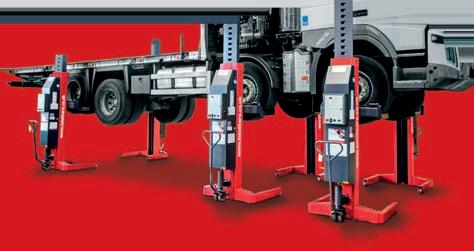




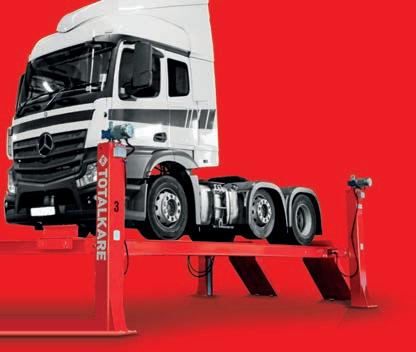




well-established provider. He happens to favour TruTac, which is owned by Microlise, but there are plenty of other options, including Descartes, Road Tech, TDi Software, and Aquarius.
Nor are their products and services likely to be any more expensive than buying an off-the-peg system with an unfamiliar name, he adds; especially given that you could be putting your O-licence in jeopardy if you go the latter route. Says Road Tech sales manager Maureen Ballance: “We charge £1 per driver and 50p per truck per week for use of our Tachomaster analysis software.”

Data that is being analysed comes from the driver’s card, which should be downloaded at least every 28 days, and from the tachograph head in the truck, which should be downloaded at least every 90 days, says TDi Software. “Analysis is important to show that the drivers’ hours laws and tachograph compliance are being met, and to ensure that operators are made aware when they are not so they can deal with any issues that may be occurring; driving without taking the required breaks, for example,” it observes.
Flagging the info
Such issues need to be flagged up quickly and be easy for the operator to identify, says Ballance.
“The approach Tachomaster uses couldn’t be simpler,” she says. “If everything is green then it’s fine, but if it comes up red then it means there has been a drivers’ hours infringement.”
Click on it, and it will tell you what the infringement was. You can then notify the driver, ensure that it is acknowledged, and that a record of what has happened is kept. “Not taking the 45-minute break is the usual one,” she comments.
If you are looking to acquire a tachograph analysis package, then ask for a demonstration before you buy, Miles advises. Speaking to other hauliers about what they use, and seeking advice from a road transport trade association if you happen to be a member of one, makes sense too.
“Remember that whichever product you choose should be able to tell you about Working Time Directive compliance,” he says.
It should be capable of providing a host of other data, including when the driver inserted his or her card, and when it was removed. The card may have been pulled prematurely. “You also need to know where all the information is being stored,” he adds.
Road Tech offers prospective Tachomaster customers a free 28-day trial with no limits to the number of downloads or users, and keeps all data on its own high-security central servers with backup servers, says Ballance. That has to be preferable to holding it on an elderly PC in the corner of a transport manager’s office that could fall over at any moment.
Miles believes data should be downloaded much more regularly than the rules stipulate so that any breaches can be addressed quickly. Asking drivers what happened several weeks after an infringement occurred is pointless, he says, because they will have forgotten.
Says Ballance: “So far as drivers’ cards are concerned, I wouldn’t leave it for 28 days because the driver could be committing the same infringement over and over again. With Tachomaster you can run reports every day or every week, as well as every month.”
Nor is there any need to go round to every truck and download data physically, she points out. Road Tech has developed DOT – Download Optimisation Technology. It allows tachograph and card data to be downloaded remotely every day courtesy of a small onboard unit that usually sits behind the tachograph, and links directly to the Tachomaster dashboard. “It costs operators £14.95 per vehicle per month,” she says.
SEEING IS BELIEVING:
Andrew Miles recommends asking for a demo before purchasing a tachograph analysis package
THE DESCARTES SOLUTION
Descartes says that hauliers can make a useful saving by pre-paying their subscription to its SmartAnalysis tachograph analysis software package.
Use it on a pay-as-you-go basis and it costs 25p per driver per working day, says the company. All vehicle unit downloads are free of charge. Sign up in advance for a year if you employ between one and 50 drivers, however, and it will cost you £46 per driver, a possible saving of at least £20 depending on the number of days individuals work, holidays, days off sick, and so on.
The saving you make depends heavily on the number of drivers you employ and the commitment you are willing to make.
If, for example, you have over 100 drivers and are prepared to sign up for five years, then it will cost you £200 per driver.
SmartAnalyis users include ABE (Ledbury). The Herefordshire-based transport firm has obtained Earned Recognition and uses SmartAnalysis to provide the required drivers hours’ key performance indicators, as well as for tachograph analysis.
Says ABE’s compliance manager Jeff Pryce: “We’ve pretty much moved everything from paper to digital, which makes it so much easier when we have our audits.”
FALSE ECONOMY: TruTac’s Jemma James believes the value of cheap plug-andplay software is questionable
As drivers approach their driving-time limit, an alert is automatically sent to their depot 15 minutes before their mandatory rest period. Says Road Tech director Adrian Barrett: “The idea is to help minimise infringements by informing the transport manager before they actually occur.” If infringements are recorded nevertheless, then another alert is sent.

Tachograph analysis software should not be viewed in isolation, but as part of a suite of packages that are required to manage a fleet, all of which should be capable of communicating with one another. Tachomaster DOT can be combined with Road Tech’s Falcon tracking technology for another £5 per truck every month.
Cross-referencing
Aquarius IT’s Asset Maintenance portal automatically cross-references with the company’s tachograph analysis software and Driver Defect App, as well as with its Time & Attendance and eSIGN technologies. The last-named allows hauliers to take control of driver infringe-
TRY BEFORE YOU BUY: Road Tech offers a free 28-day trial of its Tachomaster software ➜ 30

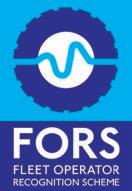


ment reports using a paperless, easily auditable approach, says Aquarius.
Director Mark Johnston says: “This total-system approach to managing all areas of fleet management data on one digital platform has proved to be not only beneficial for compliance and safety, but is also helping our customers operate more efficiently. They have full visibility of their fleets in real time.”

As well as encompassing TruAnalysis, TruTac’s TruControl includes a variety of other modules, including TruFleet as an aid to maintenance planning, and TruChecks, which is designed to make daily vehicle inspections easier. TruControl integrates with Microlise’s Fleet Vehicle Tracking.
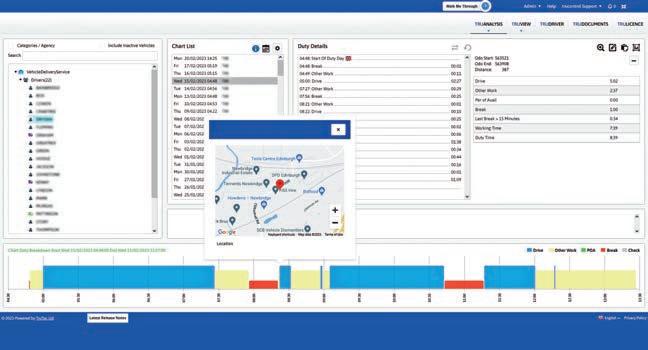
One business that makes extensive use of what TruTac has to offer is Nijman Zeetank’s UK operation. With 50 trucks and 100 trailers operating out of two sites, it specialises in transporting products for the glass and bulk liquids industries.
Says operations manager, Steve Clarke: “Our drivers have the TruControl app, which means that their tachograph information is fed back to them. They can see information about their drivers’ hours, including daily, weekly and fortnightly driving totals, and that helps us reduce infringements.
“When they do occur, then we can send debriefs straight through to the driver, who can acknowledge them,” he adds. “That’s reduced our admin considerably.”
Hardware headaches
Dodgy analysis software is not the only difficulty that bedevils operators, says Jemma James. Problematic hardware is causing headaches too, she contends.
“Hauliers are buying it second-hand with data from other operators still on it,” she reports. “Buyers assume

that it will work okay with all types of software only to discover that it won’t, and cannot download the information they need.

“Operators are also buying used trucks that haven’t had their tachograph heads locked out,” she adds. “As a consequence, they can potentially end up sending the new owner’s data to whoever owned it previously.”
Despite all the talk about data downloading and apps, there is still space for a simple, well-thought-out leaflet to aid compliance, says Novadata. Earlier this year it launched its new ‘Pocket Guide to Manual Entries on Digital Tachographs’ in a bid to eliminate the mistakes drivers may make. By unwittingly making an incorrect entry, the driver has potentially created a false record, or committed an infringement, it warns – and that could result in a fine for both driver and employer. n














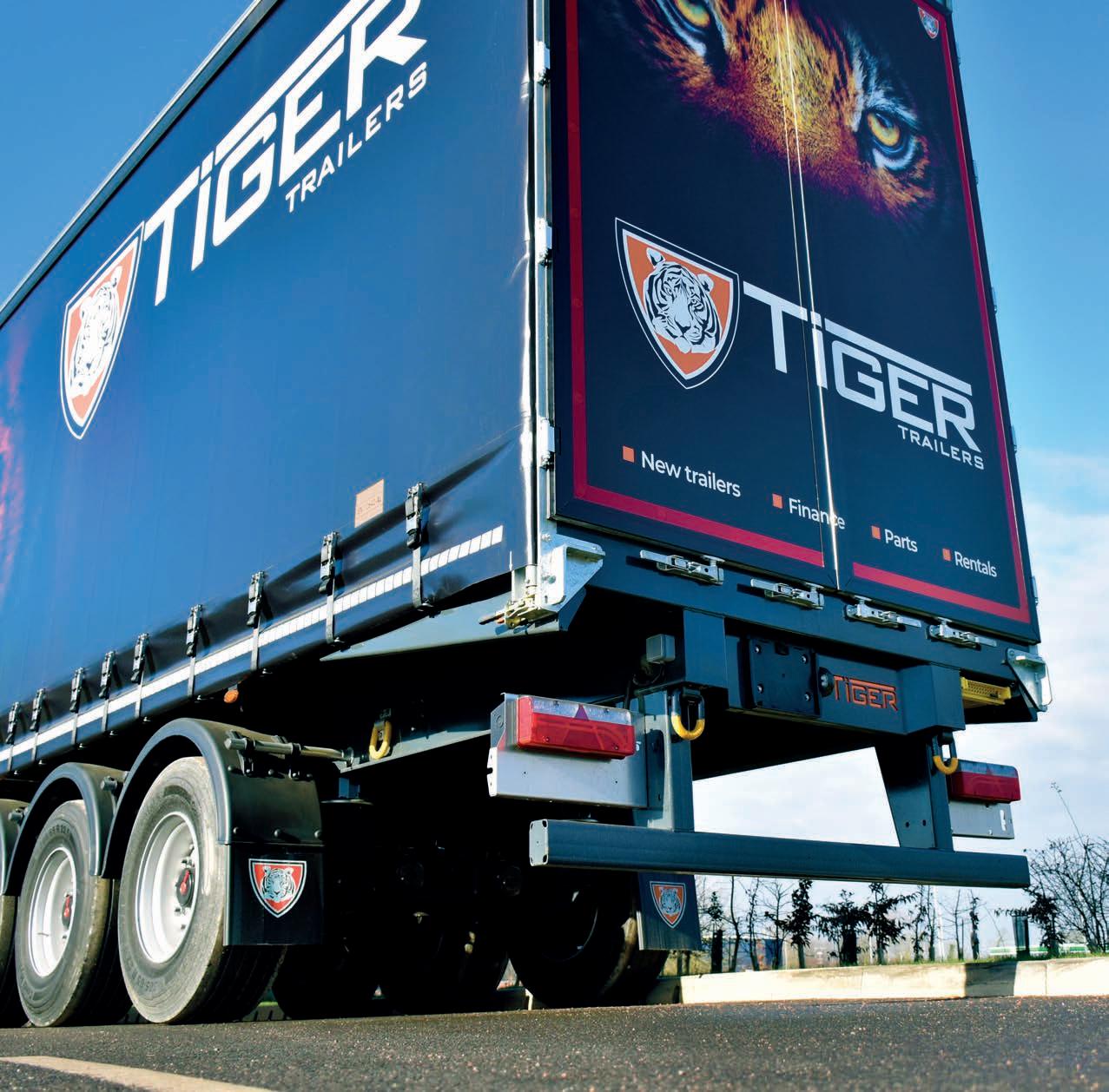

Eight years after sale, growing truck and trailer hire specialist finally makes name change
Grayrentals completes switch with TIP rebrand
Hull-based truck and trailer hire company Grayrentals has undergone a rebranding process and adopted the name TIP.
The transition signifies the culmination of Grayrentals’ integration into the TIP Group, combining its trailer and truck hire services under a unified banner.
Having maintained its autonomous identity for the past eight years, Grayrentals has gradually aligned with the TIP family since its acquisition in 2015 by the commercial vehicle specialist. This strategic integration has facilitated growth, making Grayrentals a significant player in the contract hire sector.
including rigids and tractor units. The fleet extends to encompass alternative-fuelled and electric vehicles, along with specialised offerings like cement mixers.
Mike Furnival, MD of TIP, said, “The acquisition of Grayrentals a few years ago enabled us to enhance our service offerings to our loyal customers. Terry and the Hull team have demonstrated exceptional expertise in their field, providing unparalleled service for trucks and trailers.
Volvo and Mercedes-Benz along with a number of light commercial vehicles.
All vehicles are ex-TIP fleet and will have a full service history. They will also be offered to retail customers with a comprehensive warranty package and finance options.
TIP hopes to sell more than 400 vehicles a year from its Warrington site.
The new TIP powered division continues to be led by Jonny Clark, with Terry Moody, one of the original owners, retaining a role within the TIP management team. This division’s rental fleet ranges from 7.5 tonners upwards, North West Trucks has opened a state-of-the-art dealership in Warrington close to the M62 and M6 motorways.
“While we proudly provide truck services under the TIP name, we’ve ensured that the proficiency in trucks remains uncompromised for our customers. Our product specialists and account managers who deliver these services remain unchanged.”
In addition, TIP Group has launched a used truck sales division based at its new site in Warrington. Vehicles for sale will be promoted via the TIP used
truck website, www.tip-used.com, with a specific focus on vehicles of between three and six years old.
TIP’s used vehicles will include a wide range of trucks from all manufacturers including DAF,

North West Trucks adds Warrington site
Part of the Greenhous Group – one of the UK’s largest DAF dealer groups – North West Trucks has invested £2m in the facility, building a nine-bay workshop to maintain and service all makes of truck, trailer and van.
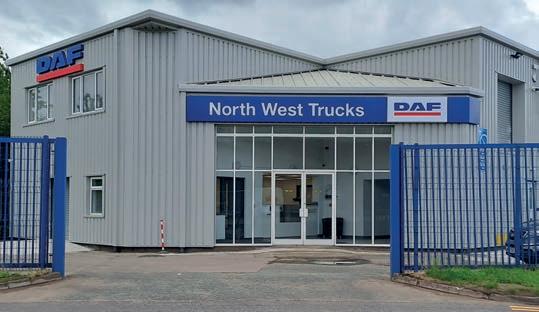
Services will include vehicle inspection, servicing, tachograph calibration, MoT preparation, dedicated bays with DAVIE diagnostics, air conditioning re-gassing and brake testing
It is planned to operate 24-hours, seven days a week, and is supported by round-the-clock parts through TRP.
The new site adds to the existing North West Trucks sites located in Huyton, Northwich, Ellesmere Port and Wigan.
Peter Brabin, depot manager at North West Trucks Warrington,
said: “This is an exciting opportunity for North West Trucks, enabling us to broaden our service offering to customers and support more vehicle operators in the local area. In addition to the new site, having another DAFaid support point on the map will enable us to reach our customers quicker to keep their businesses moving.”
Brabin added: “When a customer visits our site, they can be sure their vehicle is in capable hands. Our highly trained DAF and tail-lift technicians with IRTEC accreditation are available to ensure operators vehicles are back on the road, while North West Trucks can offer a courtesy car and collection and delivery service to ensure minimal disruption to their day.”
Russell Leach, TIP remarketing manager said: “We look forward to offering a wide range of used trucks and vans to the market, from our dedicated new premises in Warrington. TIP de-fleets up to 500 vehicles a year, all of which have been rigorously maintained throughout their usage, and we are pleased to be able to offer these to UK buyers.”
TIP will operate its own in-house refurbishment centre for used trucks, vans and trailers, in order to offer customers fully refurbished vehicles.
Williams makes move at Michelin
Michelin Tyres has appointed Carl Williams as customer engineering support team manager for the UK and Republic of Ireland to support truck and bus customers.
He will lead a team of technical managers, taking over from Rob Blurton, who retires at the end of the month after 44 years with the company. Williams, a veteran of 36 years with Michelin, moves into the role after three years as a Beyond Road regional sales manager.
He joined Michelin in 1987 on a youth training scheme apprenticeship, progressing to roles as regional fleet account manager, external training instructor and training centre manager.
AT&T grabs International Trailers for Chereau links
AT&T Rentals has acquired International Trailers, Chereau distributors for Ireland.
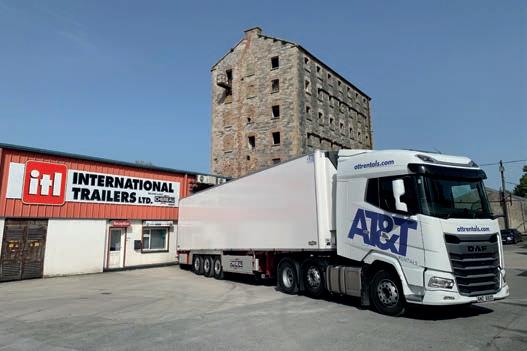
The purchase combines 80 years of experience in supplying and supporting premium brands within the refrigerated transport sector.
Based in Bagenalstown, Co. Carlow, International Trailers has been the sole Chereau distributor since 1977 when it began importing trailers from the Chereau family in western France. Today, International Trailers continues to exclusively supply the Chereau products across the island of Ireland, offering retail sales as well as stocking an extensive array of parts which are available for same- or next-day delivery. They also carry out insurance accredited repairs.
In a statement, AT&T said: “As existing Chereau service partners, acquiring International Trailers has been a logical and proactive next step for us. We look forward to building on the robust
Motus grows DAF credentials thanks to Solway deal
Motus Commercials, a division of Motus Group (UK) Ltd, has announced the addition of Solway DAF to its growing portfolio, solidifying its position as the largest DAF dealer group in Europe.
relationship we already have with International Trailers, with each business no doubt complementing the other.
“In addition, the acquisition offers further peace of mind to new and existing Chereau customers by tapping into our well-established and unrivalled service and support we’re renowned for within our industry.
Increasing use of biofuels prompts promise of network expansion
UK Fuels ups HVO offer
UK Fuels is extending the availability of HVO (Hydrotreated Vegetable Oil) from its network, as the number of operators committing to using the CO2-reducing fuel increase weekly.
UK Fuels is currently providing the renewable fuel at 14 of its accessible truckstops in England and Scotland. However, fuel card supplier Radius, which operates the UK Fuels network, has confirmed that it plans to increase this number to around 50 outlets

by the end of this year, with the next openings scheduled for Wales and Northern Ireland.
Furthermore, the collaboration with partners across the UK will enable Radius to unveil additional HVO locations in forthcoming customer network updates. This expansion also includes catering to customers with their own bulk storage tanks, enabling them to refill sustainably at their own facilities.
HVO, a renewable diesel substi-
tute derived solely from waste products, is gaining traction due to its minimal environmental impact. The inclusion of HVO in fuel offerings empowers Radius customers to significantly cut greenhouse gas emissions, potentially by up to 90%.
Radius MD UK and Ireland, Jonathan Haseler, said “This new HVO network further extends our environmentally friendly product offering as businesses transition to a greener fuel solution.”
He added that the company’s array of sustainable offerings, including the recent partnership with Element 2, the carbon offset programme Radius Future, and hybrid EV charge cards, reinforces Radius’ unwavering support for its customers’ sustainability goals.
This HVO expansion complements the partnership with Element 2, a prominent UK hydrogen infrastructure firm. The collaboration between the two companies aims to establish an extensive network of hydrogen refuelling options across the UK Fuels network.
Up-to-date details of HVO availability can be found on the e-route site locator.
With the inclusion of Solway DAF, Motus Commercials now operates 34 DAF dealerships. Solway has been representing DAF for 45 years, and operates a sales dealership in Carlisle and three service dealerships located in Penrith, Workington, and Dumfries.
The four locations employ almost 100 people, who will be retained by Motus Commercials. Peter Fullelove, the former owner of Solway DAF who has led the business since 1986, will remain in place to ensure a smooth transition for both customers and staff during the acquisition process.
Commenting on the sale, Fullelove said: “While it has been a very emotional decision for me to sell the business to Motus, its track record for business growth and people development means I have chosen the right purchaser for this business, which has meant so much to me personally for so many years.”
Matt Lawrenson, MD of Motus Commercials, added: “Opportunities to acquire strong, well-run businesses like Solway DAF are rare, and we are delighted to welcome them to our extensive DAF dealership portfolio.
“They align perfectly with our current business plan, and we are excited to further develop their operations within our group.
“We remain committed to delivering the exceptional levels of service that local operators have enjoyed from Solway DAF for many, many years.”
Lawrenson emphasised the importance of customer support in maintaining DAF’s market leadership in the UK.
“A key part of what has made DAF Trucks the market leader in the UK has been the support DAF operators expect, and get, from the whole DAF dealer network,” he said.
“This new addition to our UK DAF footprint can only increase the contribution of Motus Commercials to the outstanding DAF UK customer support profile.”

Impressively practical
Chassis Cab has undertaken a fine balancing act with the design of its new Cambridge depot, achieving a slick showroom environment without discouraging muddy boots. George Barrow takes a look around
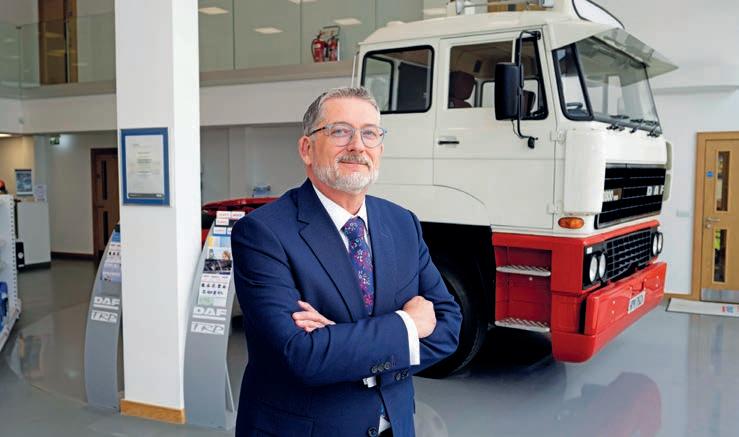
Looking at the brand-new Chassis Cab depot in Cambridge, complete with its impressive showroom-style entrance, you’d think that MD Robert Baxter was a real believer in the dealer standards DAF sets for its network. After all, it represents a significant investment, with the total cost of the land purchase and redevelopment totalling £5.4m.
Speak to him for five minutes on the subject and you’ll soon find that it’s not strictly the case. He’s definitely not against them per se, but Baxter has seen and dealt with the quirks that arise from having four sites in the Chassis Cab group and what he describes as now probably “the best looking and the worst looking” sites in the DAF dealer network. His point is that what works at the new purpose-built site in Fenstanton, near to Cambridge, won’t necessarily work at Chassis Cab’s oldest site, Universal Garage in Isleham.
Setting the standards
Chassis Cab Cambridge is undoubtedly an impressive facility, with six full-length bays and one drive-through ATF lane built on a new 5.5-acre secure site that sets the bar for DAF dealer standards. It’s also ideally placed to raise them even further when it comes to electrification. More on that later, but for Baxter, designing the new dealership has been something of a balancing act. There’s obviously a need to have a functional site that makes money, but also a site that fits the bill for its many stakeholders.
“If we had had to give up parts storage space or workshop space to do it [the reception area and showroom] like this it wouldn’t have worked, because parts and workshop space is what we make our money out of. Fortunately, we were able to give it the visual impact DAF wanted, and also design a dealership that works for us and for the people coming in here,” Baxter says.
“The drivers have a waiting room, and shower facilities they can use while the truck is being looked at. We’ve tried to give them a reasonable environment, because they deserve that. But you go to the other extreme, and we get the construction guys that come in with their 8-wheelers and they are like liquid mud. We’ve got to make them feel comfortable. If we make it too clinical, you could alienate a lot of the people who drive trucks because they won’t want to go in in their mucky boots. It’s a fine balance. Most people who buy a truck never come in to look at them. I would say my three biggest customers have never been to the dealership. We go to them,” he explains.
The new site has managed to achieve that balance and it certainly is practical, with two inspection pits, two ramps and a set of mobile lifts in the workshop, which is currently averaging 550 sold hours per week. That’s a big improvement on the 440-hour capacity of the workshop at the previous site in Newmarket Road. Furthermore, the design, which puts the parts guys with the workshop, has paid dividends.
“If we could do the same at some of our other branches, we would, but we can’t knock the buildings around enough to make that happen. We do see it as a big advantage. They’re aware of what’s going on, and what’s coming in. It works having a central hub for workshop control and parts,” Baxter says.
There have been unquestionable improvements all round at the new site, where £730,000-worth of spare parts, representing 6,893 individual part lines, are now being stored. The relocation to a business park site surrounded by lakes also ensures the new premises isn’t going to get engulfed by housing and the like, which has happened at other locations. There’s an additional benefit to the new location because, although it’s not yet ready to service electric vehicles, there should be adequate capacity and infrastructure to do so in the future. The site was formerly owned by Ryder, which maintained a sizeable fleet of refrigerated trailers.
“If we look at the business argument for spending £5.5m in Cambridge, it doesn’t stack up. This building won’t pay for itself in my lifetime. But it’s an asset we now own, and it’s a long-term gain and a site we can grow into. It was workshops for Ryder. If it had been empty when
we bought it, we might have laid it out differently but because it already had the existing building on it that we were renovating and extending, we had to think about how it worked for us. That’s why we put the shorter ATF lane on the end, and that’s the only drive-through bay.
“I spoke to the mechanics, then we looked at our Ipswich site, where we have doors at either end. But with mechanics nowadays, their toolboxes are so big and are all over the place, so even though we can drive through, we have to move stuff to do it. They tend to drive in and reverse out – which you don’t need too much room for. It’s the swing when you’re driving through where you need the space.
“When Ryder built it, it was built for a completely different operation. This was the workshop and yard for a dairy that was near the Cambridge Services. Ryder did the maintenance, and there were standby plugs all the way around for the fridge trailers. Ryder supplied vehicles and maintained them for the dairy. This workshop was built long before all the lakes and business park, and it’s been the site of a truck operation, one way or another, for many years. Where these lakes are now was where they took all the material out to build the A14. There was no requirement to have a drive-through workshop and it works well like this, because we can have all the staff cars at the back.”
Charging ahead
Adapting the site to support the future needs of electric trucks shouldn’t be a problem for Chassis Cab. Baxter points towards an electrical substation, tell us that there’s 600kW of power available from there, then goes on to say that there’s another one behind the building and that they have 600kW of power coming into the building as well. It’s a very different scenario to its other sites, including Bury St Edmunds as an electric service centre, and the recently revamped Ipswich site, where Baxter jokes that if they were to use all the roller-brake testers at once and then plug in the kettle, they’d have a problem. The new Cambridge site shouldn’t have that issue, though.
While mass uptake of electrified vehicles may be some way off, Chassis Cab is keeping up the pace where it can with its network. However, Baxter is realistic about the cost and use-case for such investment.
“There are two trains of thought and I get both of them,” he says. “One of them is that if we don’t [install
chargers], if we don’t build the infrastructure, the trucks won’t come. And the other one is that if we put them all in, there’s nothing to plug into them. At the moment, the level of investment it would take to install these 150kW chargers – one in every main dealer – is phenomenal. I can’t install one in Ipswich without a huge upgrade, but I could put one in here and that would be more logical to me. But if I put one in here, I reckon it would be June next year before anything plugged into it, because there are no electric trucks around yet. If you don’t have the infrastructure, you can’t sell the trucks. And if you don’t sell the trucks, there’s no one to use all these chargers and to make them viable.”
It’s clear there’s still some work to be done even at the new site, but Chassis Cab Cambridge is a shining example of how a modern truck dealer looks and, although it wasn’t able to work from a completely blank sheet of paper, the end result seems to have pleased everyone.

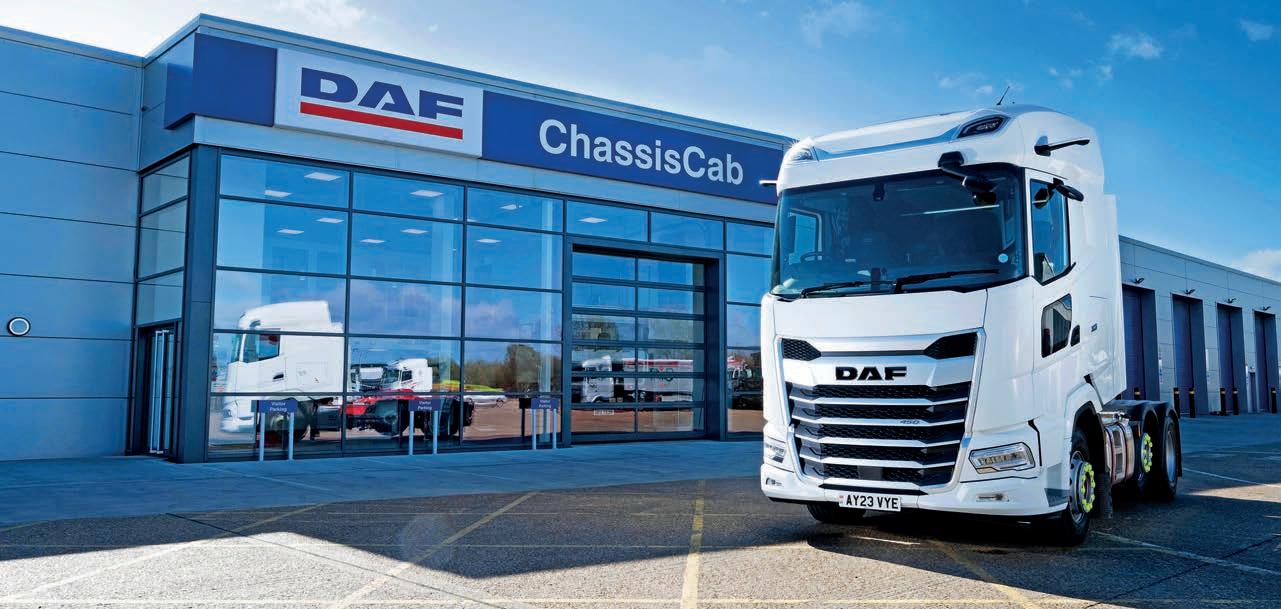
“We most probably got one thing wrong – which was the crane,” Baxter says. “In the old branch, we thought it was in the wrong place, so here we have it moving side-to-side. Now that we’re using it, we’d probably have it moving up and down as well.”
All things considered, if after such a massive project the crane is the only change, we’d consider that a job well done. n






















